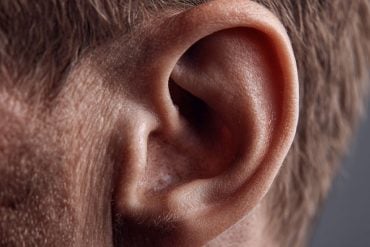Summary: A new study of nearly 2,000 former NFL players reveals that about one-third believe they have chronic traumatic encephalopathy (CTE), a condition linked to repeated head trauma. Those who believed they had CTE reported higher rates of cognitive problems, depression, chronic pain, and suicidality compared to those who did not.
Researchers emphasize that CTE can only be diagnosed post-mortem and that many of these symptoms may result from treatable conditions. The study calls for a focus on treating co-occurring health issues to alleviate symptoms and improve mental health.
Key Facts:
- 34% of former NFL players believe they have CTE.
- Players concerned about CTE reported more depression, cognitive issues, and suicidality.
- Treating co-occurring conditions like low testosterone and chronic pain may improve outcomes.
Source: Mass General
A new study of nearly 2,000 former NFL players shows that about one-third believe they have chronic traumatic encephalopathy (CTE), a neuropathological condition linked to repeated head trauma that can only be diagnosed through a post-mortem exam of the brain.
According to the study authors, players who believed they had CTE reported significantly more cognitive problems and a higher proportion of low testosterone, depression, headaches, and chronic pain, compared with those who did not have concerns about CTE. These conditions and others have been shown to cause cognitive problems even in those without head injury, indicating such symptoms could be independent from CTE.

The study, which was conducted by a team including Mass General Brigham researchers who are part of the Football Players Health Study at Harvard University, is published Sept. 23 in JAMA Neurology.
The researchers warn that all neurocognitive symptoms need to be taken seriously by clinicians. These include neurodegenerative changes in the brain, considered and ruled out through neurocognitive assessments, including physical exams, MRI and CT scans. This is because neurocognitive symptoms may arise from a variety of causes not related to CTE, a condition that can only be diagnosed definitively on autopsy.
The researchers also caution that players with neurologic symptoms and suicidality may indeed be eventually diagnosed with CTE, but that can only be learned through a post-mortem exam.
“As complex human beings, our beliefs can exert a strong impact on our health,” said coauthor Ross Zafonte, DO, President of Spaulding Rehabilitation and Chief of the Departments of Physical Medicine and Rehabilitation at Massachusetts General Hospital and Brigham and Women’s Hospital. Zafonte is also the principal investigator of the Football Players Health Study at Harvard.
“The symptoms that raise CTE concerns are real and CTE concerns are valid, but it’s critical to understand that having persistent fears about this condition can take a toll on mental health. When these concerns discourage former NFL players from receiving effective treatments for other or interrelated conditions related to physical and emotional health, it’s our responsibility to intervene.”
Receiving a diagnosis of incurable neurodegenerative diseases such as Alzheimer’s, Parkinson’s and Huntington’s disease are associated with elevated suicide risk. To investigate whether the perception of CTE shows similar associations with suicidality, the researchers surveyed 1,980 former professional football players.
They wanted to find out what proportion believe they have CTE, which player characteristics were commonly associated with this belief, and whether CTE concerns were associated with frequent thoughts of suicide or self-harm.
The analysis showed that 34% of players believe that they have CTE. Participants who expressed concerns about CTE were more likely to report low testosterone, depression, mood instability, pain, cognitive symptoms and more reported head injury.
Approximately 25% of participants who believed they have CTE also reported suicidality compared with 5% of participants who did not believe they had CTE. In analyses that accounted for the influence of depressive symptoms on suicidality, those who believed they had CTE were still twice as likely to report frequent thoughts of suicide or self-harm, even if they report similar levels of depression.
This finding suggests that some suicidality may stem from the assumption that a former player has an untreatable neurodegenerative disease rather than from depression. While concerns about CTE are legitimate, treating comorbid conditions may alleviate symptoms and improve overall mood, the researchers said.
“A key takeaway from this study is that many conditions common to former NFL players such as sleep apnea, low testosterone, high blood pressure and chronic pain can cause problems with thinking, memory and concentration,” says first author Rachel Grashow, PhD, MS, of Harvard T. H. Chan School of Public Health.
“While we wait for advances in CTE research to better address living players’ experiences, it is imperative that we identify conditions that are treatable. These efforts may reduce the chances that players will prematurely attribute symptoms to CTE which may lead to hopelessness and thoughts of self-harm.”
Since CTE can currently only be diagnosed on autopsy, the researchers cannot rule out the possibility that some of the players who reported concerns do, in fact, have CTE-related brain changes, but they say that it’s important for former players and their clinicians to focus on the things that can be treated.
“Until clinical guidelines and treatments for CTE become available, former players and their physicians should explore treatment interventions and positive health behavior changes that have been shown to improve cognitive function, overall health, and quality of life,” says senior author Aaron Baggish, MD, a professor of Medicine at the University of Lausanne in Switzerland, and a senior faculty member of the Football Players Health Study and former Director of the Cardiovascular Performance Program at the Massachusetts General Hospital Heart Center.
“Interventions including weight loss, exercise, improving sleep and implementing a low-salt diet may improve cognitive function.”
Authorship: In addition to Zafonte, Grashow, and Baggish, other Mass General Brigham authors include Grant L. Iverson, Frank E. Speizer, and Daniel H. Daneshvar. Additional authors include Douglas P. Terry, Heather DiGregorio, Inana Dairi, Cheyenne Brown, Paula S. Atkeson, , Alicia J. Whittington, LeRoy Reese, Jonathan H. Kim, Niki Konstantinides, Herman A. Taylor, and Marc G. Weisskopf.
Disclosures: Baggish has received funding from the National Institute of Health/National Heart, Lung, and Blood Institute, the National Football League Players Association (NFLPA), and the American Heart Association and receives compensation for his role as team cardiologist from the US Olympic Committee/US Olympic Training Centers, US Soccer, US Rowing, the New England Patriots, the Boston Bruins, the New England Revolution, and Harvard University.
Zafonte reported receiving royalties from Springer/Demos publishing for serving as coeditor of the text Brain Injury Medicine; serving on the scientific advisory board of Myomo Inc, and onecare.ai Inc; evaluating patients in the Massachusetts General Hospital Brain and Body–TRUST Program, which is funded by the NFLPA; and receiving grants from the NIH. Grashow received grant funding from the NFLPA. Additional author disclosures can be found in the paper.
Funding: The Football Players Health Study is supported by the NFLPA. The NFLPA did not contribute to the design and conduct of the study; collection, management, analysis, and interpretation of the data; preparation, review, or approval of the manuscript; and decision to submit the manuscript for publication.
This work received support from Harvard Catalyst | The Harvard Clinical and Translational Science Center (National Center for Advancing Translational Sciences, National Institutes of Health, Award UM1TR004408) and financial contributions from Harvard University and its affiliated academic healthcare centers.
The content is solely the responsibility of the authors and does not necessarily represent the official views of Harvard Catalyst, Harvard University and its affiliated academic healthcare centers, or the National Institutes of Health.
About this CTE and neurology research news
Author: Ryan Jaslow
Source: Mass General
Contact: Ryan Jaslow – Mass General
Image: The image is credited to Neuroscience News
Original Research: The findings will appear in JAMA Neurology






